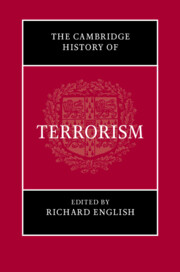Book contents
- The Cambridge History of Terrorism
- The Cambridge History of Terrorism
- Copyright page
- Contents
- Figures
- Tables
- Acknowledgements
- Contributors
- Part I Introduction
- Part II Frameworks and Definitions
- Part III Historical Case Studies in Terrorism
- 7 Terrorism in Israel/Palestine
- 8 Terrorism in the Basque Country
- 9 Terrorism in African History
- 10 The History of Terrorism in Pakistan
- 11 Political Violence in Ireland
- 12 Terrorism in the Russian Empire
- 13 Terrorism in Post-Soviet Russia
- 14 Terrorism in the Netherlands
- 15 Terrorism: An American Story
- 16 Political Violence and Terrorism in Colombia
- 17 The Paths of Terrorism in Peru
- 18 Aiqtihams (Whirlwind Attacks)
- 19 Transnational Connections
- Part IV Thematic Essays
- Part V Conclusion
- Index
- References
9 - Terrorism in African History
from Part III - Historical Case Studies in Terrorism
Published online by Cambridge University Press: 07 May 2021
- The Cambridge History of Terrorism
- The Cambridge History of Terrorism
- Copyright page
- Contents
- Figures
- Tables
- Acknowledgements
- Contributors
- Part I Introduction
- Part II Frameworks and Definitions
- Part III Historical Case Studies in Terrorism
- 7 Terrorism in Israel/Palestine
- 8 Terrorism in the Basque Country
- 9 Terrorism in African History
- 10 The History of Terrorism in Pakistan
- 11 Political Violence in Ireland
- 12 Terrorism in the Russian Empire
- 13 Terrorism in Post-Soviet Russia
- 14 Terrorism in the Netherlands
- 15 Terrorism: An American Story
- 16 Political Violence and Terrorism in Colombia
- 17 The Paths of Terrorism in Peru
- 18 Aiqtihams (Whirlwind Attacks)
- 19 Transnational Connections
- Part IV Thematic Essays
- Part V Conclusion
- Index
- References
Summary
There has been a marked increase in incidents of terrorism – and correspondingly a growth in the study of terrorism – in Africa over the last twenty years or so. Yet a brief survey of the phenomenon in historical context reveals that terrorism in Africa has long been both complex and prevalent. There is clearly novelty, in the course of the twentieth and early twenty-first century, in terms of external linkages, ideologies and technology at terrorists’ disposal; this is true of both state and non-state actors. However, it is clear enough that some patterns of terrorist activity can be discerned as flowing from Africa’s deeper past. Therefore, it is important to see terrorism, in its historical and its contemporary forms, as part of the totality of violence in Africa. Connected to that, terrorism cannot be removed from the socio-economic and political conditions within which it takes place. Africans have considerable experience of state terrorism – from the slave trade and the state-building exercises of the precolonial era, to imperial partition, to the brutal excesses of authoritarian systems in the recent past. Marginalised, subjugated or otherwise dispossessed communities have sought to curtail these projections of power and resist, using whatever tools available. Terrorism cannot be segregated from wider contingencies – most obviously, economic and political aspiration and desperation, which fundamentally shape attitudes towards human life, or more precisely the taking of it, at particular moments in time.
- Type
- Chapter
- Information
- The Cambridge History of Terrorism , pp. 199 - 222Publisher: Cambridge University PressPrint publication year: 2021

